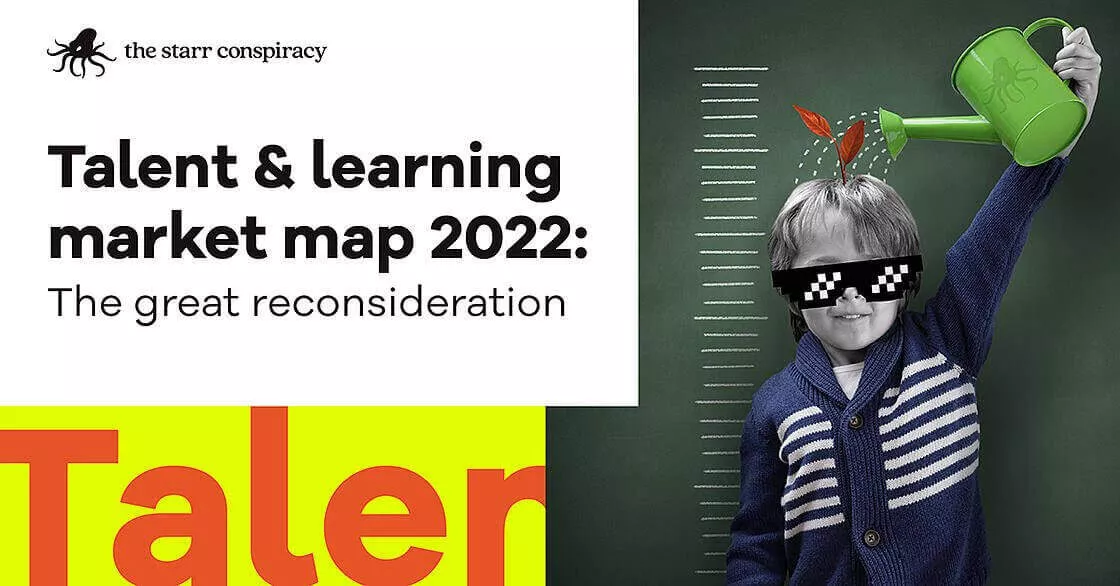November 1, 2022
Talent & Learning Market Map 2022

Overview and Market Map
Talent and Learning management software suites were the vanguard of taking HR Tech from on-premises into the cloud in the early 2000s. Brands like Taleo, SuccessFactors, Kenexa, Cornerstone OnDemand, and many other bygone brands (RIP Saba, Halogen, Lumesse, Plateau, SumTotal, et al.) defined the industry. Behind the organizing principle of SaaS, these solutions seemed innovative at the time, but now they’re viewed as more iterative, as they mainly just automated the manual talent processes that hadn’t changed that much from the last 30 years of the 20th century. The typical product set for these integrated talent management platforms was:
- Talent Acquisition/ATS
- Performance/Goal Management
- Learning Management/LMS
- Succession Management
- Compensation Management
However, there was enough perceived value in these solutions that drove major ERP and HCM brands to jump on this bandwagon to drive growth (Workday, Kronos, and Ultimate Software) or play catch-up from being anchored to the on-premises world (SAP, Oracle, and IBM).
By the 2010s, it became clear that the processes underpinning SaaS-based talent and learning solutions were insufficient to serve the changing work styles of the global workforce, driven by millennials, mobile devices, and UX expectations driven by social media. A new generation of upstart brands came into market to challenge incumbent solutions.
- Talent: Reflektive (now a part of PeopleFluent), Betterworks, 15Five, and Lattice took different approaches. Continuous Performance Management (CPM) — with an angle toward one-on-ones, more frequent performance conversations, and a preference toward OKRs over SMART goals — became “modern/next-generation performance management.” Surveys and employee recognition functionality have also been added into the mix.
- Learning: The LMS-centric view of corporate learning was challenged by new-school LMSs like Docebo and Bridge (then with Instructure, now with LTG), Learning Experience Platforms such as Degreed, EdCast, Fuse Universal, and others, as well video-forward, bite-size, learner-centric platforms like Lynda (now LinkedIn Learning), Udemy, Udacity, Coursera, and others.
Even with all of the new lines of code and product functionality that talent and learning upstarts brought to market, behind all of the mobile functionality and glittery “consumer-grade” UIs, much of the functionality was still geared toward a top-down, hierarchically driven, command-and-control view of the workplace. Cascading goals, KPIs, curricula, and course completions were still the order of the day; these were less of a benefit to employees and still more of a boot to kick their asses.
When the world of work changed in 2020, many enterprises felt like many traditional approaches weren’t in line with the zeitgeist. Performance management felt less important than coaching, continuous feedback, and mentoring. Formal learning felt less impactful than bite-size learning, performance support, and learning in the flow of work.
Today, talent systems are evolving to deliver value in a working environment of newfound realism. There are still some remnants of the incumbent vs. upstart category structure in place, but much more diversity is flourishing.
- Incumbents hanging on: For all the talk of post-pandemic market changes, there are still a surprising number of employers who don’t want to change a damn thing. The big ERP/HCM players with technical debt and bloated, archaic approaches to talent and learning will still be able to squeeze revenue out of these solutions for years to come. At the same time, they will be looking to acquire innovative solutions, taking advantage of lots of cash on hand during market downturns to make opportunistic purchases. In learning, don’t overlook Cornerstone and LTG as aggressive acquirers.
- Aspiring category dominators: Some of yesterday’s upstarts like Lattice, Betterworks, and Gtmhub in talent and Degreed, 360Learning, Udemy, Udacity, and Coursera in learning are leveraging growth and fundraising success to make power plays of their own.
- A new wave of innovative upstarts: The different needs and working styles of remote and hybrid work are resulting in new solutions coming into market rapidly, like Berlin’s Leapsome in Talent and San Francisco’s WorkRamp in Learning. Industry specialists are another key trend with companies like AskNicely (customer service training), SkyPrep (an LMS for legal training), Arcoro (an HR platform with talent and learning for construction), and many other industries. Finally, the deskless workforce is finally getting solutions designed for its unique needs in talent (like Portland, Oregon, startup AskNicely) and learning (eduMe out of the U.K. and Northpass). NYC-based Pavestep is a CPM that has succeeded in making a pitch to the needs of distributed, remote teams.
